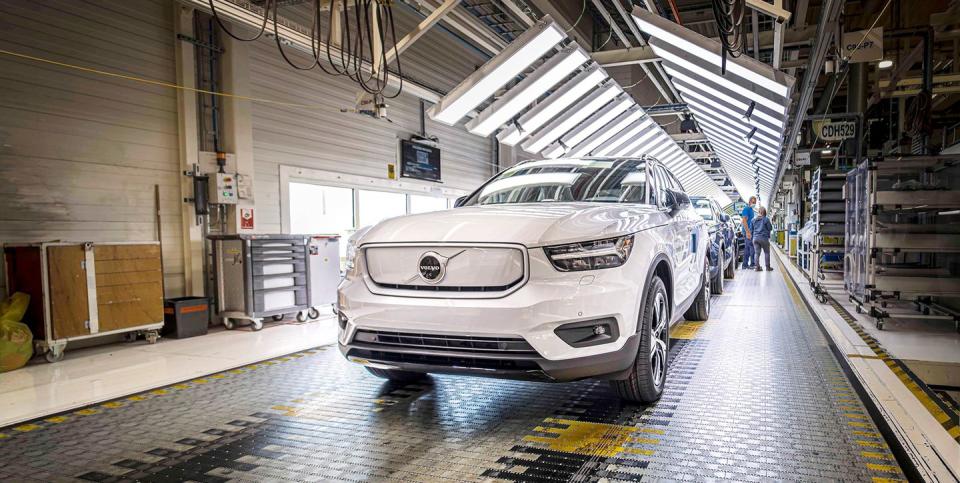Volvo Triples Down on EV Building Capacity in Europe

Demand for XC40 Recharge prompts Volvo to triple building capacity in Belgium.
The automaker's CMA platform underpins Volvo, Lynk & Co,. Polestar, and Geely cars.
Volvo plans to offer only electric cars by 2030.
Volvo is increasing its stake on electric cars by drastically increasing its EV building capacity across the Atlantic. The automaker has tripled its electric vehicle manufacturing capacity at its plant in Ghent, Belgium, which produces the XC40 Recharge electric SUVs, due to the steadily growing market share of electric cars in Europe. The share of Recharge models as a percentage of the automaker's total sales more than doubled in 2020 compared to 2019, the company noted.
The XC40 Recharge, which was launched last year, and a hybrid version of the XC40 are produced in Ghent, with Volvo expecting the plant's capacity to more than triple by 2022. But they'll soon be joined by others, as Volvo plans to roll out one new electric model per year through the year 2025.
The next all-electric Volvo model will debut this year and will not be offered in gasoline form at all, unlike the XC40. While Volvo hasn't disclosed just which segment this year's new electric model will land in, the automaker has already indicated that a fully electric version of its XC90 SUV is in the works. That's in addition to the Polestar models that the automaker has rolled out thus far, with the longtime Volvo tuner having become a separate brand for its EVs after being absorbed by Volvo.
Overall, Volvo expects that 50% of its vehicles will be electric by 2025, while the other 50% will be hybrids. So internal combustion engines are very much on their way out of Volvo's lineup.
"Our future is electric and customers clearly like what they see from our Recharge cars," said Volvo Head of Global Industrial Operations and Quality, Javier Varela. "As we continue to electrify our lineup and boost our electric production capacity, Ghent is a real trailblazer for our global manufacturing network."
Perhaps even more consequential, when it comes to production volume, will be vehicles based on CMA modular vehicle architecture that will be built by Volvo's sibling Geely brand in China, which purchased Volvo over a decade ago, as well as the new Lynk & Co. brand. As many vehicles as the Ghent factory will be able to produce for Europe and North America on the CMA platform, meant for small and midsize vehicles, Geely and Lynk & Co. produce a greater variety of vehicles on that platform for the Chinese domestic market, including seven other models under their own brands. The battery-electric Polestar 2 also sits on the CMA platform, making it the fourth standalone brand to rely on the CMA platform.
So as consequential as the tripling of EV capacity will be in Ghent, the real volume for CMA platform cars lies elsewhere, even if not all of the models are electric for now.

 Yahoo Autos
Yahoo Autos 